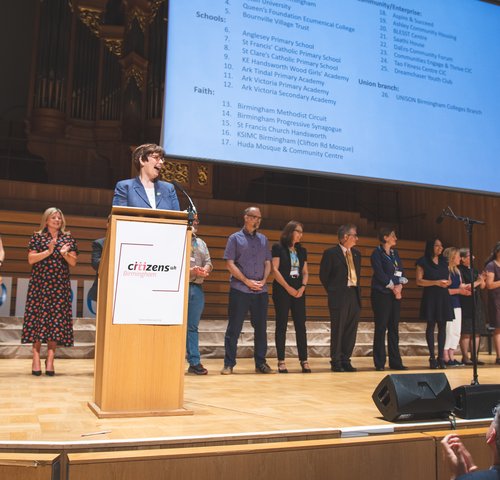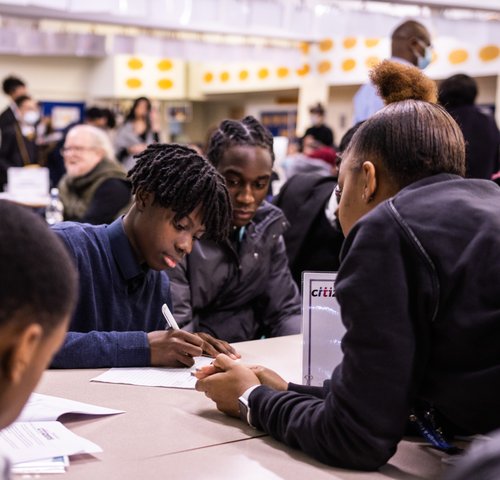'Your Actions have shamed us today!'
'Your Actions have shamed us today!'
-Meeta Dave & Heidi Shewell-Cooper
"Your actions have shamed us" - so said a local neighbourhood ward councillor in the summer of 2019 to an assembled group of Year 6 students, parents, and wider community representatives gathered in a small community park area, directly in front of Radford Primary Academy, inner-city Nottingham.
The students had shared the results of their research into the experiences the children and their families of local parks. Surveys for families, visits out to all the nearby play areas and conversations with their peers confirmed their views; they felt unsafe, not valued, and wanted to play in a bright and clean environment. Only a few weeks before they had photographed the broken bottle on the baby swing, overflowing bins and poorly maintained equipment, and called out the local council urgently to remove the dangerous items.
These children were proud of their school and this area, literally on the way to the school entrance, did not make a good impression at all – something needed to be done. On cue, moving from presentation to the park with local councillors, housing patch managers, PCSOs and environmental officers, the Police had to deal with an inebriated man lying in the middle of their play area as they shared stories of the anti-social behaviour that made them fearful to play out.
A team of Year 6 pupils, together with a small group of parents had grasped the opportunity to hold local decision-makers to account and made direct requests for change in their park. People turned out, the action got a reaction – a clean-up was instigated, the Anti-Social-Behaviour patrol car came by more regularly and there were promises of using the consultation, led by the pupils, to support funding applications, better security and environmental repairs. Year 6 passed on the baton as they left and the new Year 6 students have been working on their negotiation skills, ready to call their local councillors back to hold them to account for the promises made and not yet delivered. This is an ongoing project and still some work to be done but the leaders know the pupils are a force to be reckoned with.
High deprivation, gang culture, and substance misuse are some negative terms from a long list associated with Radford. Therefore, it is not surprising that most people have a very negative impression of the area and community. This was reflected to some extent in the school about 12 years ago when our work in the area of social action started. We realised we needed to devise a curriculum which would address some of the underlying issues our pupils and families faced if they were going to succeed academically. At that time aspirations were low; pupils were not thinking about their futures and meaningful parents who wanted the best for their pupils were not sure how to go about it. The curriculum at the time was very much a “done to” model where there was little pupil involvement or very few – if any – links with the community. The school council had little impact.
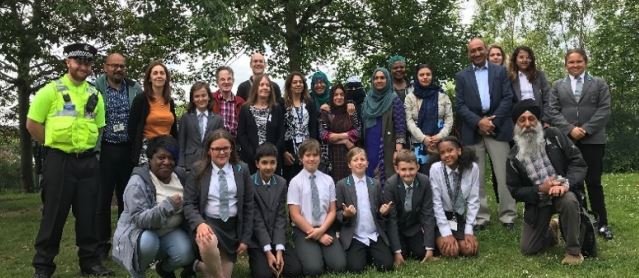
On the surface, we could see that we were covering all the statutory requirements: we had a fantastic staff team who wanted the best for the pupils however, digging deeper, we could also see we were not preparing our pupils to be active global citizens as stated in our school vision. It seemed then that our pupils believed the negative headlines that were associated with Radford and therefore they had little to offer. This was the one major change that had to take place. We had to develop character, leadership skills, and make sure pupils were taking responsibility not just for themselves but also for others.
Initially, this was in small steps, within the school, where pupils were driving changes that mattered to them. Because of them, the school lunch system was changed, the behaviour policy (including sanctions and rewards), and even some aspects of the school uniform. Pupils were taking more and more responsibility in a meaningful way. They could see that they could influence change. In a snowball effect, we witnessed that the more success the pupils had, the more action they wanted to take. They began planning and taking assemblies on issues that mattered to them or felt needed to be addressed in school. They took responsibility for helping other pupils with their learning, or those that struggled at playtimes. They helped in the dinner hall, spoke to the pupils who had had “Time Out” and discussed the impact of their behaviour on themselves and others – the list grew and grew.
It was clear then that the pupils were at a stage where they were ready to start thinking about the impact they could have in the community. They had certainly built the skills and believed no challenge was too great for them.
At that time, we came across “Sewa Day” which is an international day of volunteering – and the strap line was one of Mahatma Gandhi’s quotes: “Be the change you want to see in the world”. Although quite deep, we shared it with the pupils and asked them in what ways they could make a positive difference to the quality of someone else’s life. Initially, they could only think of raising money as that is what charity meant to them. It took much discussions and exploration until they understood that this work could also be done through public service. Eventually every class decided on an action they wanted to take. Because they had taken the lead role and planning of their work, it was personal to them and they were keen to help others. What they didn’t expect was what they got back in return. After the actions, they explained how it made them feel good about themselves. They felt the appreciation and gratitude they received far outweighed their efforts.
This became the catalyst for further social action work in the community but also an integral part of the curriculum. ‘Lead, Empower, Achieve, and Drive’ are the four key principles that drive all the work in our school and Trust. Opportunities to build character and develop these skills and attributes are embedded in the curriculum as we believe that this is what will support pupils not only to become successful in their lives but also understand justice and equality and their responsibility for others so they can be active citizens. Therefore, the development of this work was easily woven into the curriculum in a meaningful way. It was unique to our school because it was intrinsically linked to our community and more importantly it was the pupils who were driving the initiatives which meant that it was relevant to them. We were able to easily link the work to our PHSE curriculum and there were many opportunities to discuss some of the questions in our Philosophy for Pupils sessions. Developing communication was a priority for our pupils and this work gave pupils opportunities to debate, present, take part in formal meetings and hold leaders to account. The content of the tasks was no different to those that had been planned in the curriculum before. The only difference this time was they had a real purpose linked to our context which the pupils related to.
The work developed further when the school joined Nottingham Citizens. The systematic process of listening campaigns, planning, and taking actions was followed at a school level. Pupils collated information from parents, businesses, members of the local community and groups. They identified loneliness, the environment, and homelessness as the main concerns of the community at that time.
They organised themselves into groups and planned actions to address these areas. Over the following two terms they started to implement their action plans in authentic ways. They organised a visiting scheme where groups of pupils regularly met with OAPs at the day centre. During the time of the listening campaign the pupils had heard that many of them did not have much contact with young people and had little company. A rapport was built easily between them and an hour each week passed quickly while they shared experiences and stories and helped each other to complete tasks. Again, the main purpose had been to make a positive difference to the lives of our community members, but we were able to link the visits to some of our history and science objectives. It was another opportunity for pupils to develop their confidence and their social and communication skills.
Also, to address loneliness the pupils organised a community dinner and invited members of the community that were experiencing loneliness. These groups ordinarily would not come together and were isolated for a variety of reasons. Using the partnerships that the school had made the pupils were able to source the ingredients, free of charge, from local businesses. They organised help from a nearby charity who were experienced in cooking on a large scale and held the necessary food and hygiene qualifications. Since the food was going to be prepared during the day the pupils realised that they needed to involve other adults. Therefore, they explained the cause and its importance to their parents and managed to get a group to volunteer their time and support. The pupils were great hosts, serving food, socialising and building relationships. People were brought together to have a meal and make friendships. This event was very well received from some of our most vulnerable community members. We also found that aside from the main purpose of community action there are always other benefits. On this occasion we were pleased that the pupils had shared their plans with their parents so that they too were involved. Some of them attended the meal and offered to make the next meal for the community. This had become an event organised by the community, for the community.
As time has gone on, more and more people, including staff and parents have joined in the work and there is strong sense of community who believe in action for the common good. There has been a gradual, but noticeable, change in the way the way pupils think and behave. They have no hesitation in taking responsibility or action whether in school or the community and beyond. The curriculum supports these principles and has developed too where pupils are able to take control of their learning. It is now very much the model we aspired to “done with and not done to”. This has not been at the expense of valuable curriculum time or attainment. In fact, quite the opposite. This year the school celebrated being in the top 3% of schools nationally for the progress from Key Stages 1 to 2. What the school is just, if not prouder of, is that we can confidently say that our pupils are active global citizens. They will explain the reason for their actions, in a very matter of fact way – that it’s not because someone is watching, not for reward but just because it’s the right thing to do. We believe education really can, and should, go beyond the school gates.
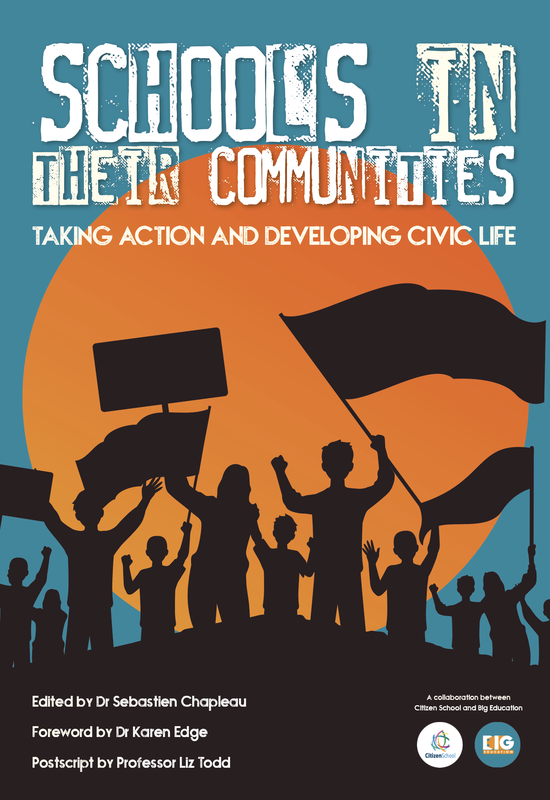
Schools in their Communities
This is an extract from Schools in their Communities; Taking action and developing civic life by Sebastien Chapleau.
Click below to download your free e-book and read more case studies on schools involved in Community Organising.
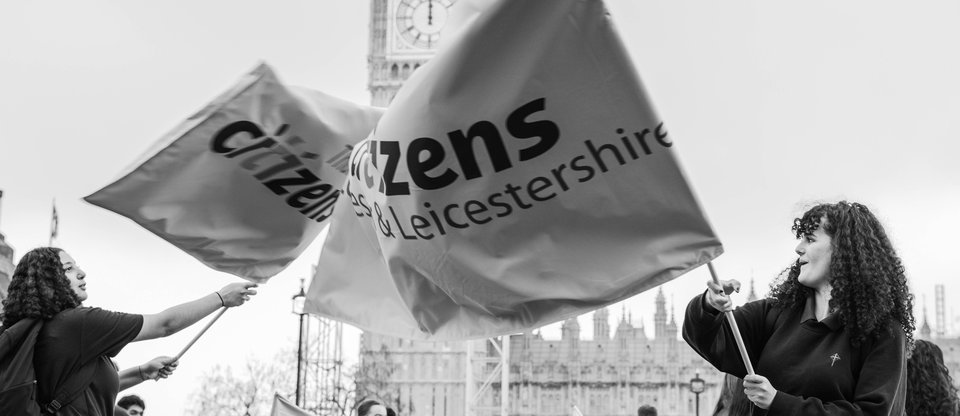
Citizens UK is made up of hundreds of member organisations that are committed to taking action together for social justice and the common good.
We believe that faith, education, trade union and community organisations play a vital role as civil society institutions with deep and long-standing roots in their local areas. Through voluntary participation in these organisations, people build relationships, trust, vision and hope - and learn how to work constructively with those they might disagree with, to focus on what they have in common.


